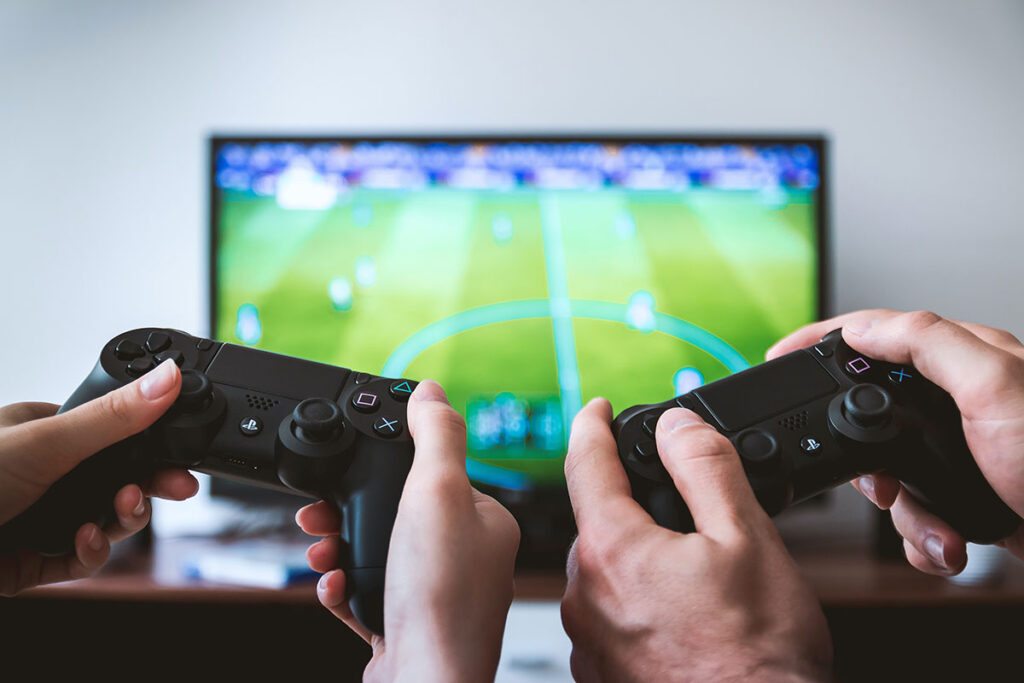Stress and anxiety frequently cast their long shadows in today’s world, so the pursuit of robust mental health is a top priority for many people. While conventional practices such as meditation, therapy, and exercise are undeniably effective, there is an alternative avenue for enhancing mental well-being: the world of gaming.

Yes, you read that correctly. Video games, often perceived primarily as a source of entertainment, have been proven to offer mental health advantages when engaged with mindfulness and moderation. Furthermore, games, like those available here, possess the potential to support not only mental but also financial well-being. Let’s delve into the interplay between gaming and mental health, uncovering how games can elevate your overall well-being.
Cognitive Benefits Of Gaming
Video games proffer an expansive array of cognitive benefits that transcend the confines of the digital landscape. Immersion in gaming activities can catalyze significant enhancements across various mental faculties, rendering it an invaluable pursuit for individuals intent on augmenting their cognitive prowess. Below are the principal cognitive benefits attributable to gaming:
- Elevated Problem-Solving Aptitude: Numerous video games present players with intricate puzzles and tasks that necessitate creative problem-solving. By navigating these virtual enigmas, gamers can cultivate their critical thinking skills and devise innovative solutions—skills that readily translate to real-world scenarios.
- Heightened Decision-Making Skills: Strategy games, in particular, compel players to make swift, informed decisions to outmaneuver adversaries or accomplish objectives. The perpetual demand for decision-making hones your capacity to assess situations, consider repercussions, and make well-informed choices—a skill set of immeasurable value both personally and professionally.
- Sharper Reflexes and Coordination: Action-packed games routinely test a player’s reflexes and hand-eye coordination. Regular exposure to these game dynamics can culminate in enhanced motor skills, quicker reaction times, and refined hand-eye coordination—attributes with practical applications in everyday life.
- Spatial Awareness: Many video games entail the navigation of intricate virtual landscapes, fostering the development of spatial awareness and a heightened grasp of 3D environments. Gamers often exhibit an improved sense of direction and an enhanced ability to visualize spatial relationships.
- Memory Amplification: Memory constitutes a cornerstone of cognitive function, and gaming can contribute to its improvement through various avenues. Games often necessitate the retention of complex combinations, strategies, or narrative arcs, facilitating enhanced recall and retention capabilities.
- Extended Attention Span: Video games demand sustained attention and focus, especially during intense gameplay sequences. This builds an expanded attention span and the capacity to concentrate on tasks for prolonged durations—an attribute particularly advantageous in academic and professional spheres.
- Multitasking Proficiency: Many games oblige players to concurrently manage an array of tasks, such as character control, resource monitoring, and responses to in-game stimuli. This cultivates multitasking prowess that readily translates into enhanced time management and efficiency in daily endeavors.
- Pattern Recognition: Certain games, such as rhythm or puzzle-based ones, necessitate the recognition and response to patterns. This skill can prove beneficial in diverse contexts, encompassing the detection of trends in data, comprehension of intricate systems, and identification of patterns within routine activities.
Expanded Learning Capacity: Video games frequently introduce players to novel concepts, rules, and fictional realms. Engagement with these elements triggers a process of learning and adaptation, amplifying your capacity to assimilate new information and acclimatize to unfamiliar scenarios.

The Power Of Distraction
One of the foremost ways in which gaming contributes to enhanced mental health is through the art of distraction. Engaging in a game, whether it takes the form of an adrenaline-pumping shooter or a soothing puzzle, possesses the remarkable ability to momentarily divert your focus from the burdensome weight of stress and emotional turmoil. This temporary diversion can be profoundly therapeutic, offering a much-needed respite from the daily grind.
Recent scientific investigations have unveiled that even a brief gaming session can significantly alleviate stress levels. When you immerse yourself in a game, your cognitive faculties pivot toward the challenges inherent to the virtual realm, affording you a momentary respite from your worldly concerns. The outcome? Reduced cortisol levels—the notorious stress hormone—usher in a state of serenity and tranquility.
Social Connection In A Virtual World
In the contemporary digital era, online gaming stands as a formidable platform for social interaction. Multiplayer games, in particular, serve as conduits for individuals to forge connections with counterparts spanning the globe. This facet of social engagement within the realm of gaming can serve as a lifeline for those contending with anxiety or other mental health hurdles that in-person socialization involves.
The cultivation of friendships and the honing of teamwork abilities within virtual gaming communities can wield a profound impact on self-esteem and a sense of belonging. As you collaborate with fellow gamers to attain shared objectives, a profound sense of accomplishment and camaraderie takes root, transmuting into enhanced mental well-being.
Stress Relief And Relaxation
Beyond distraction, gaming bestows a sense of relaxation and escapism upon its adherents. There are games that immerse players in captivating virtual realms, where they can unwind and explore without bounds. This mode of relaxation is especially invaluable for individuals grappling with conditions such as anxiety or depression.
Roaming through breathtaking virtual landscapes, embarking on epic odysseys, or simply basking in the soothing sights and sounds of a game can induce a meditative experience. This, in turn, can alleviate the symptoms of anxiety and depression, fostering a more optimistic mental state.
Mindfulness Through Gaming
Mindfulness, characterized by the practice of remaining fully engaged in the present moment, has garnered acclaim for its salutary effects on mental well-being. Astonishingly, gaming can serve as a conduit for cultivating mindfulness. When deeply immersed in a game, your attention naturally gravitates towards the task at hand, unburdened by the shackles of past or future concerns.
This heightened state of concentration mirrors the mindfulness attained through meditation. Over time, infusing mindfulness into your gaming experience can train your mind to be more attuned to the present in your daily life, ultimately culminating in reduced stress and enhanced mental clarity.
Conclusion
Gaming and mental well-being stand not as disparate realms but rather as harmonious allies. When approached with mindfulness and moderation, gaming becomes a potent instrument for enhancing your mental equilibrium. As you reach for your controller or embark upon your favorite virtual adventure, ponder upon the possibility that you are, in essence, starting a journey toward a more robust and contented state of mind.
Featured photo by Ron Lach on Pexels.



